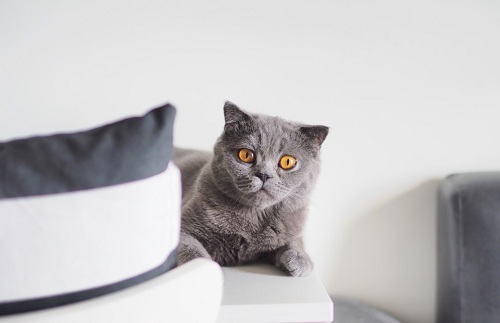Any pet’s human owners and family members become its whole world. Staying in a family makes them close to their human friends, and they adjust to living alongside the humans with time and practice.
Just like human beings, cats get affected by stress and anxiety. Stress affects the cat’s physical condition and even leads to behavioral problems.
Cats can immediately sense any change of attitude from their homeowners. As intelligent creatures by nature, they can get affected if their owners seem distant and harsh.
Stressed-out cats leave their owners anxious, especially if they do not understand the reason behind changes in cats’ behavior or health.
If you are wondering why your cat is behaving strangely of late -it is often due to stress and anxiety. To help your cat in the best way, you need to figure out the reasons that are causing the stress.
If your cat has a phobia or something that makes it upset, you know the possible reason -It is stress. But, if the stress factor has built up slowly over time, it is difficult to understand, and even if you do so, the reason is hard to find. Before understanding the r behind anxiety, you must acknowledge that your cat is stressed.
Managing Anxiety in Cats – The Ultimate Guide
Cats cannot accept changes. Even a minute change in their environment which may not bother you, can stress cats. Causes may include the following reasons
Change in the household
Cats can react strangely to some changes in the household. It may be because someone new is joining the household or leaving the house. A baby coming into the house or the death of someone leaves them in stress. Even if a guest comes to your place for some time or some days, it can trigger stress in cats.
Whatever the changes in your house, you need to keep the cat’s world normal as far as possible. Try to keep their feeding schedule fixed like usual times.
Also, provide them with a safe place to hide if they want to. Introduce your cat to someone new very patiently. Allow the cat to come around that new person on its own.
You can involve them in a play session and offer your feline friend lots of treats to establish a positive connection. Trying to rush things up can make it difficult.
Moving to a new address
Changing residence triggers anxiety in cats. The reason is simple- they do not like life changes. So, whenever you are planning to move to a new address along with your pet kitten, it is significant to plan.
You can keep the kitty busy with its toys, litter box, food, bed, and blanket locked in one room while you shift stuff from the rest of the house. While arranging the new address, you must arrange the room for your kitten first, with all its known things.
Something that your kitty loves should be there in the carrier when you are transporting your pet to the new address in a car, plane, or train.
Alteration in daily routine
For a new job, maybe, you are getting home late than usual, or a new responsibility at work keeps you too busy off late. Your cat could sense the changes in your daily routine and become nervous.
If possible, introduce the changes in your routine gradually to the cat. The cat will then be able to adjust to the new schedule if you spend some quality time playing with your pet when you are home. During the transitional process, the cat has its safe corner, and meals are offered regularly.
Read Also: 12 Things Your Cat Does Not Like
Outdoor stress factors
Sometimes your housecat sitting by the side of the window and gazing out of that may explore that another cat, a strange animal, or someone unfamiliar has entered the yard. It soon becomes frustrating as it cannot get outside. It may start showing aggression at that moment.
To stop this, you need to obstruct the view of your cat. Keep it away from the window for some days. In the meantime, ensure no strangers or animals intrude on the yard.
Showing too much affection
Pet parents are sometimes the reason for stress in cats. However strange it may sound, being overly affectionate may make your cat uncomfortable.
It is essential to learn the body language of the cats. Respect their space and build a positive bonding. You will play with it, reward it with treats and show affection as long as your pet is comfortable.
Various other factors can stress out the cats. They can be anxious if:
- They get a new smell like- laundry detergents, fragrances, room fresheners, scented candles, or cleaners.
- They see their reflection in the mirror.
- They have to share a litter box and food bowl with other cats.
- They hear loud noises or a party is going on in the house.
- They have to go to the veterinary clinic.
How to relieve a cat’s stress and anxiety?
To gift your cat a stress-free life, you need to take care of a few things, as discussed below:
- Establish a routine for your kitten and try to stick to it.
- Avoid making any sudden changes in your cat’s environment. Remove all the factors that can make your cat uncomfortable and anxious.
- If you are planning to bring in a new animal like a cat or a dog to the house, try to keep them in different rooms and gradually introduce them in a neutral space which may lead to a better relationship among them.
Read Also: 10 Reasons Why Cats Run Away from Home & How to Deal with It
Apart from removing the stressors, it would be best if you created a cat-friendly environment. Plenty of interactive toys, a place where the cat could climb and play, and any hideouts to play can keep your cat away from boredom and will not let stress build up.
A traumatized cat can act differently. You can sense and see the change. Stress-induced behavior can make a cat engage in destructive activities. Hiding, panting, pacing, howling, excessive vocalization, shaking, defecation, and urination are signs of emotional trauma in cats.
Your first step to comfort your cat would be to keep your pet active. Use interaction as a tool to comfort your cat. You can introduce some toys and games that would engage the cat.
Conclusion
Remember, any sign of chronic stress can give rise to various health issues. Changes can take place suddenly. Identify the triggers and take note of them. If you are concerned about your stressed-out cat, try to take it to the vet first.
Your vet can judge the situation and, as an expert, can devise a solution to calm the cat. Getting your cat out of anxiety is essential, and you must keep your stress level down.

 DogExpress
DogExpress




















 in Chandigarh, India.
in Chandigarh, India. 
